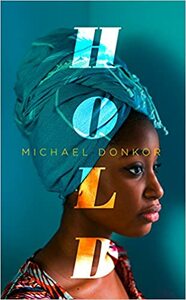Take a photo of a barcode or cover
I’m tempted to give this book 3.5 stars given how much I enjoyed about 75% of it, but the last 25% or so really made that impossible. From about the point where Mary dies, I lost track of a lot of the story. Although I have a vague understanding of what is happening around Belinda in the last portion of Housegirl, I don’t understand what she’s feeling or why she is acting the way she is. But what really irritated me was the unsatisfying way in which Donkor ends the novel. The threads with Amma (the character who I was perhaps most interested in) and Belinda’s mother aren’t even close to being resolved in my opinion, which left me feeling unsatisfied and disgruntled. Perhaps a second reading in the future would resolve these feelings, but right now I struggle with the idea that I will read this again.
This is quite a debut! Michael Donkor covers a lot of ground in this immersive tale of Belinda the Ghanaian housegirl who moves to London to be a calming influence on Amma the daughter of an expatriate family whose lack of connection to their culture and thoroughly western mindset is driving her parents to distraction. Donkor addresses the problems adapting to a culture as a stranger, whether it is an entirely new world as London is to Belinda or something born to but never fundanentally experienced as Ghana is to Amma.
These two main characters play off eachother perfectly, bringing their different strengths and weaknesses to light; Amma's privilege and self-centredness, Belinda's conservatism and meekness. Both have huge strength and heart and each allows the other to come to terms with their own struggles. But Donkor also tackles the station of Ghanaian women, British racism, homophobia with tact and skill. Most impressively he has written a novel fully peopled with sensitively-rendered, whole, layered women brimming with vices and voices. They live on the page in the penetrating descriptions of Ghana and Britain which are rendered both strange and familiar by gazes of the characters.
Funny, moving, insightful, immersive, Hold tugs on all of the emotions and has more than enough intellect to balance out all that heart.
These two main characters play off eachother perfectly, bringing their different strengths and weaknesses to light; Amma's privilege and self-centredness, Belinda's conservatism and meekness. Both have huge strength and heart and each allows the other to come to terms with their own struggles. But Donkor also tackles the station of Ghanaian women, British racism, homophobia with tact and skill. Most impressively he has written a novel fully peopled with sensitively-rendered, whole, layered women brimming with vices and voices. They live on the page in the penetrating descriptions of Ghana and Britain which are rendered both strange and familiar by gazes of the characters.
Funny, moving, insightful, immersive, Hold tugs on all of the emotions and has more than enough intellect to balance out all that heart.
emotional
funny
reflective
slow-paced
A coming-of-age story which describes the building friendship between two teenage girls. It's a decent enough read, but never really grabbed me; I found myself doing other things rather than hurrying back to get on with the book.
Belinda knows her place in the world, when her father cannot pay for her anymore, her mother sends her away to work in the household of people she calls Aunt and Uncle in accordance with Ghanaian customs. She is not the only maid there, also 11-year-old Mary works for them and quickly becomes something like a sister Belinda never had. When Belinda is sent to England to take care of Amma, a girl her own age, the two have to part which isn’t easy for either of them. Yet, they manage to stay in contact over the thousands of kilometres that now separate them. Mary wants to know everything about Belinda’s posh life in London, but the older sister cannot tell everything that she experiences in England. Her role is different now which is hard to get used to and people behave in a different way. She misses her home town, but also sees the chance that she is given since she can go back to school and study. When a tragic incident calls her back to Africa, Belinda realises that only a couple of months were enough to change her completely.
Michael Donkor was born in England to a Ghanaian household and trained as an English teacher and completed a Master’s in Creative Writing. He was selected as a “New Face in Fiction” by The Observer in January 2018. “Hold” is his debut novel in which also autobiographical elements can be found even though his protagonist is female and he has lived all his life in the UK.
What I liked about the novel were the different perspectives on life that you get and the difficulties that living between different cultures can mean for you personally but also for the people around you. First of all, I hardly know anything about Ghana so the beginning of the novel when we meet Mary and Belinda, young girls who work full time as maids, gives a short glance at what life in other parts of the world might be. They were not treated especially bad, quite the contrary, but the fact that the lack of money in their family leads to giving up education is something which is far away from our world in Europe.
Most interesting also Belinda’s arrival in London and her awareness of being different. She has brown skin, but this is different from the Asian brown of the Indians or the skin of the girls from Jamaica. It is those slight differences that are of course seen by the members of those groups at the margin but often neglected by the majority society. Even though she shares the same cultural background with Amma, the two girls could hardly be more distinct. The most obvious is their sexual orientation where Belinda sticks to a romantic understanding of love and where Amma has her coming-out as homosexual. Belinda can easily adapt to a lot of things, but this clearly transgresses a line that she will not cross. The girls’ friendship is nothing that comes easy for both of them, but it splendid how Donkor developed it throughout the novel.
Without a doubt, Michael Donkor is a great new voice among the British writers who themselves have made the experience of belonging - but not completely, of being trapped between cultures and having to find their identity while growing up.
Michael Donkor was born in England to a Ghanaian household and trained as an English teacher and completed a Master’s in Creative Writing. He was selected as a “New Face in Fiction” by The Observer in January 2018. “Hold” is his debut novel in which also autobiographical elements can be found even though his protagonist is female and he has lived all his life in the UK.
What I liked about the novel were the different perspectives on life that you get and the difficulties that living between different cultures can mean for you personally but also for the people around you. First of all, I hardly know anything about Ghana so the beginning of the novel when we meet Mary and Belinda, young girls who work full time as maids, gives a short glance at what life in other parts of the world might be. They were not treated especially bad, quite the contrary, but the fact that the lack of money in their family leads to giving up education is something which is far away from our world in Europe.
Most interesting also Belinda’s arrival in London and her awareness of being different. She has brown skin, but this is different from the Asian brown of the Indians or the skin of the girls from Jamaica. It is those slight differences that are of course seen by the members of those groups at the margin but often neglected by the majority society. Even though she shares the same cultural background with Amma, the two girls could hardly be more distinct. The most obvious is their sexual orientation where Belinda sticks to a romantic understanding of love and where Amma has her coming-out as homosexual. Belinda can easily adapt to a lot of things, but this clearly transgresses a line that she will not cross. The girls’ friendship is nothing that comes easy for both of them, but it splendid how Donkor developed it throughout the novel.
Without a doubt, Michael Donkor is a great new voice among the British writers who themselves have made the experience of belonging - but not completely, of being trapped between cultures and having to find their identity while growing up.
It seemed OK when I was reading it, I didn't seem to struggle with the language, but I didn't question it as I'm not Ghanaian. It's not a book that will stay with me. I struggled a little with dramatic out of character moments that were never deeply explored, in fact, there was little depth to anything in the book. Didn't find it difficult to finish it, but I'm not bothered about it. I did like the concept but it needed to be a deeper darker read to fully cover everything - there was potentially a lot going on and a lot to unravel, but we just skimmed everything.
challenging
reflective
sad
tense
slow-paced
challenging
dark
emotional
reflective
sad
medium-paced
Plot or Character Driven:
Character
Strong character development:
Complicated
Loveable characters:
Complicated
Diverse cast of characters:
Yes
Flaws of characters a main focus:
Yes
This book was completely not what I expected, at all. It was charming and uncomfortable all at the same time. I wish it had ended slightly differently, but overall I loved it. Once you get past the initial chapters it transforms into a heartbreaking page-turner, and as my family will attest to, I didn’t put it down. I learnt a lot about Ghanaian culture as well - reading this book was an enriching experience in more ways than one
The writing style was not for me. I found myself cringing and skipping lines. If you enjoyed it that's great but it simply was not for me and honestly it just caught me in the wrong mood.
I wanted to like this book so much more than I did. While there were bits of prose that were beautiful, the storyline was engaging and parts of Amma’s struggle with her own sexuality felt authentic, much of it missed the mark.
The book really lacked a good editor.
A good editor would have questioned the author on his crass descriptions of lesbian desire, of stereotypical depictions of the African diaspora, black Londoners and private school girls, and particularly of the inner workings of a young girls mind. The obsession with nipples, c**t and softness really derailed the book for me as it felt so utterly inauthentic.
My knowledge of Ghanaian culture is limited and so I found the elements of the story based there totally fascinating and beautifully detailed but I question whether they were a true representation as the depiction of a London I know well, fell fairly flat.
With better editing and direction, and possibly telling his own story rather than Belinda’s (or any other woman for that matter) Michael Donkor could be a very good writer.
The book really lacked a good editor.
A good editor would have questioned the author on his crass descriptions of lesbian desire, of stereotypical depictions of the African diaspora, black Londoners and private school girls, and particularly of the inner workings of a young girls mind. The obsession with nipples, c**t and softness really derailed the book for me as it felt so utterly inauthentic.
My knowledge of Ghanaian culture is limited and so I found the elements of the story based there totally fascinating and beautifully detailed but I question whether they were a true representation as the depiction of a London I know well, fell fairly flat.
With better editing and direction, and possibly telling his own story rather than Belinda’s (or any other woman for that matter) Michael Donkor could be a very good writer.






